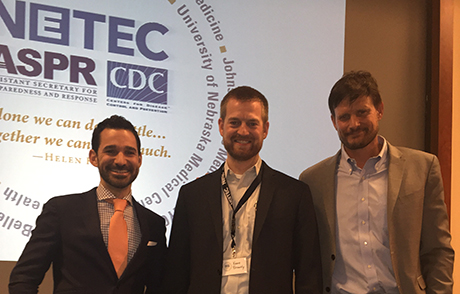Health care providers from 10 medical centers around the U.S. designated by the government as regional Ebola treatment centers spent two days learning and sharing experiences, expertise and best practices at the National Ebola Treatment and Education Center (NETEC) Summit. The summit was held on May 11-12 at Emory University.
NETEC is led by faculty and staff from Emory University, the University of Nebraska Medical Center/Nebraska Medicine and NYC Health + Hospitals/ Bellevue. All three health care facilities safely and successfully treated patients with Ebola virus disease in 2014. A $12 million grant from the U.S. Department of Health and Human Services’ Office of the Assistant Secretary for Preparedness and Response (ASPR) and the Centers for Disease Control and Prevention (CDC) funds the program.
“The NETEC Summit was intended to bring together all of the Ebola virus disease regional treatment centers to collaborate, share information and learn skills from each other to prepare for treating patients with highly communicable diseases,” says Bruce Ribner, MD, medical director of the Serious Communicable Diseases Unit at Emory University Hospital and principal investigator of NETEC. “Preparation, knowledge and having the needed support are of the utmost importance in creating the best outcomes for the patients and their caregivers.”
“What makes a unit function safely is the staff,” says Phil Smith, MD, medical director of the University of Nebraska Medicine Biocontainment Unit. “Staff who are willing to take care of a patient with a life-threatening disease need to be identified and trained, then practice what they’ve learned to develop a mutual trust with the team.”
Over the past year, Emory, Nebraska and NYC Health + Hospitals/Bellevue have focused on sharing their knowledge and training and preparing other health care facilities and public health jurisdictions to safely identify, isolate, transport and treat patients with Ebola virus disease and other emerging threats. Topics on wearing the proper personal protective equipment (PPE), setting-up a dedicated lab to handle blood samples from highly infectious patients and managing pediatric and pregnant patients with Ebola virus disease were covered in break-out sessions at the conference.
Three U.S. Ebola virus disease survivors recounted their experiences during a survivor panel at the summit. Physician Kent Brantly, MD, who was treated at Emory University Hospital and was the first American patient brought back to the U.S. for treatment of Ebola virus disease, says this conference is critical for planning and preparation for future communicable illnesses.
“I’m thankful for all of the people who were prepared ahead of time at Emory and who were ready to take care of me in my time of need,” says Brantly. “It’s people like them who are willing to put themselves on the line to step up and care for patients, when otherswant to stay far away.”
Ian Crozier, MD, an infectious disease physician, was Emory’s third patient diagnosed with Ebola virus disease. He praises the unique care given to patients with Ebola at the bedside.
“The interaction between a caregiver and a care-receiver that happens at bedsides, particularly Ebola bedsides, is a very important aspect of their care,” says Crozier. “This is a difficult role when caregivers are in PPE and patients are delirious and confused. I think I bring a unique perspective, as each of the survivors do, having been on both sides of that curtain.”
Emergency medicine physician Craig Spencer, MD, was treated at NYC Health + Hospitals/Bellevue for Ebola virus disease in 2014. He says being an Ebola survivor has changed the way he cares for his patients now in the emergency room.
“I think I have a new empathy for what it’s like being in a bed and being on the other side of that health careprovider/patient relationship,” says Spencer. “It’s changed the way I’ve interacted with my patients and it’s certainly made me more appreciative of what it’s like to be in that bed and not feel well.”
Summit participants learned that Ebola has taught both the survivors and their care teams many lessons.
“Bellevue does have a long history of responding to infectious disease crises, but Ebola represented a new challenge for us and I think the challenge isn’t over for us, or for others around the globe,” says Laura Evans, MD MSC, medical director of Critical Care, NYC Health + Hospitals/Bellevue.
The take-home message for conference attendees – preparation and planning are key. Brantly knows that message all too well.
“For those of you who have never treated a patient with Ebola or any other highly infectious disease, but you’re here making the preparations to do so…thank you,” says Brantly. “If Dr. Ribner and the team at Emory had not been doing that for 10 or 12 years ahead of time, I probably would have been among the many statistics in West Africa.”
For future NETEC training conferences, visit http://netec.org/.

